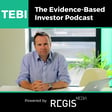
Ep 16: Dave Nadig on the extraordinary growth of ETFs
Even those with only a passing interest in investing can’t have failed to notice the extraordinary rise in recent years of ETFs.
Exchange traded funds now account for around $4.3 trillion of global assets under management — up $1 trillion on this time last year. And although the pace of new product launches has slowed, there are now around 6,300 exchange-traded products worldwide.
There are several reasons why investors should consider them, not least because they’re very cheap compared to conventional mutual funds.
For the latest episode of the TEBI Podcast, John Swolfs from Inside ETFs has been interviewing Dave Nadig, CEO of ETF.com about this remarkable phenomenon.
Among the questions they tackle are these:
Are ETFs growing too fast?
Are there too many products available?
When will start seeing cryptocurrency ETFs? and
When eventually a downturn comes, what will be the impact on the ETF market?
















